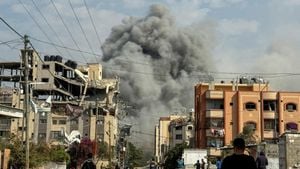Uttar Pradesh is currently grappling with significant delays surrounding the recruitment of assistant teachers, stirring controversy among local political leaders and potential candidates. The issue intensified after the Allahabad High Court ordered the state government to produce a new selection list for 69,000 assistant teacher positions within three months.
This ruling invalidated previous selections issued back in June 2020 and January 2022, which included around 6,800 candidates from the reserved categories. This change has fueled accusations from the opposition, particularly from the Samajwadi Party.
Akhilesh Yadav, the chief of the Samajwadi Party, voiced strong criticisms on August 20, claiming the ruling Bharatiya Janata Party (BJP) government aims to delay the recruitment process deliberately. He pointed out the state administration's request for three months to complete the selection process, which he believes is unnecessary.
Yadav said, "Computer can prepare the complete list for honestly appointing 69,000 teachers in three hours." He suggested the state's prolongation of the process raises suspicions about the government's intentions.
The allegations don't stop there; Yadav hinted at the BJP possibly seeking to escalate the matter to the Supreme Court to stall it even longer. "This is creating doubts among the candidates against the scam-ridden BJP government," he asserted.
He accused the BJP of showcasing its real character, implying their actions contradict the commitments made during their political campaigns. Earlier, Chief Minister Yogi Adityanath assured the public of the importance of reservations, emphasizing the principle of fair play for all candidates.
Adityanath reiterated the government's support for reservations, stressing efforts to avoid injustice within the recruitment process. Following the court ruling, he directed the Basic Education Department to align its procedures with the judiciary's guidance.
The recruitment process for assistant teachers has long been marred by complications and controversies. Following the recent court order, many hopefuls are anxiously waiting for clear communication from state authorities amid these developments.
This delay could mean prolonged uncertainty for thousands of aspiring teachers who have been preparing for this recruitment for months, if not years. With the new ruling, all eyes remain on how the Uttar Pradesh government will navigate this challenge moving forward.
Political tensions continue to rise as the selection delays have become polarizing issues for different party factions. Leaders from rival parties are quick to capitalize on the situation, framing it as emblematic of larger issues within the state administration and its governance.
Opposition parties have made public statements criticizing the current government's recruitment strategy, claiming it threatens the integrity of the educational workforce. With rising frustration from potential candidates, there is heated dialogue around the future of teacher selections and how the government intends to handle existing grievances.
Meanwhile, the involved political parties, especially the BJP, must contend with mounting pressure from citizens eager for timely resolutions. The situation encapsulates the broader sentiment among constituents, calling for transparency and effective governance.
With recruitment timelines now under judicial observation, stakeholders are left to navigate this complex scenario. All parties involved are acutely aware of the need to balance political maneuvering with public confidence.
Yadav's comments reflect not only the discontentment but also the concerns shared by many aspiring teachers who wish for fair and prompt employment opportunities. With public support increasingly rallying behind these sentiments, the forthcoming weeks are likely to be pivotal for the recruitment process.
State officials are now under heightened scrutiny as citizens and candidates alike demand accountability and adherence to judicial directives. They will need to proceed cautiously to restore trust among the affected individuals.
It will be interesting to watch how the Uttar Pradesh government progresses with this recruitment challenge as they weigh the various political and legal factors involved. The road to filling these teaching positions is sure to be fraught with obstacles, making it imperative for state leaders to act decisively and responsibly.
Looming deadlines and public expectations will test the capabilities of the administration to deliver on the court's order and provide clarity to the recruitment process.
Political analysts will be observing closely as the situation develops, with potential ramifications for future elections on the line. For now, the teachers’ recruitment saga continues to be at the forefront of Uttar Pradesh’s political discourse, encapsulating both the aspirations and frustrations of many individuals across the state.



